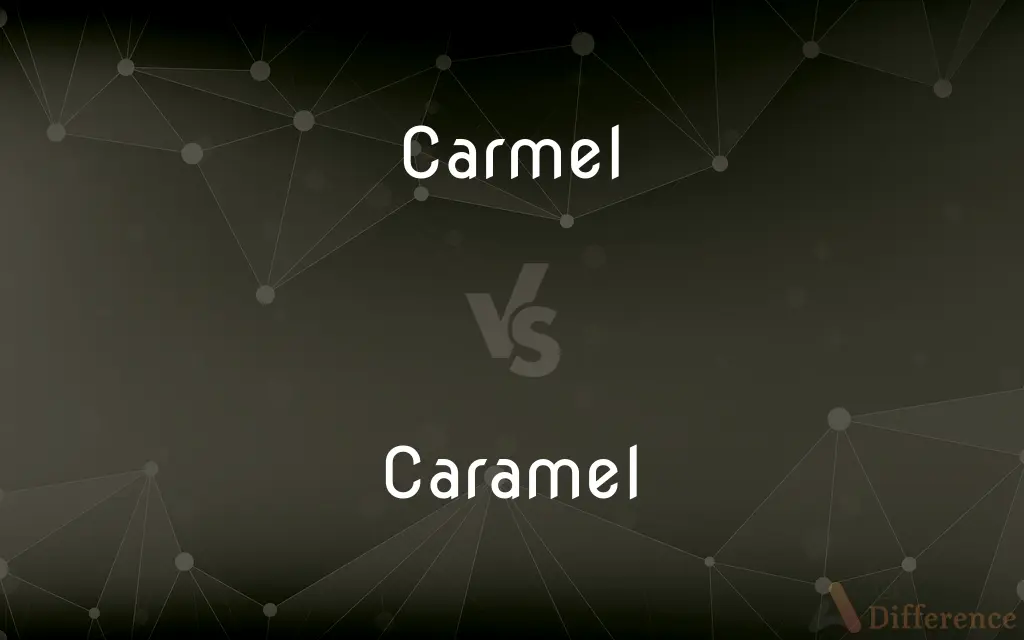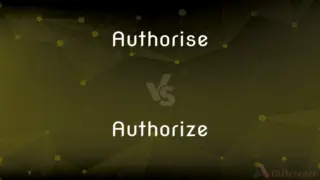Carmel vs. Caramel — What's the Difference?
Edited by Tayyaba Rehman — By Fiza Rafique — Updated on September 21, 2023
Carmel typically refers to a place, like Mount Carmel in Israel, while Caramel is a sugary confection or flavor. Pronunciation often distinguishes them, but not always.

Difference Between Carmel and Caramel
Table of Contents
ADVERTISEMENT
Key Differences
Carmel primarily serves as a proper noun, commonly referencing geographical locations like Mount Carmel or the city of Carmel in California. It has strong historical and religious connections, especially in Abrahamic religions.
Caramel, on the other hand, is a noun that describes a sweet, brown substance made by cooking sugar, often used as a flavoring in desserts and candies. It has culinary origins and is associated with gastronomy and confectionery.
In terms of pronunciation, Carmel is often said as "Car-mel," while Caramel can be pronounced as "Car-a-mel" or "Car-mel," depending on regional accents. The pronunciation nuances sometimes create confusion but are usually context-dependent.
The spelling of Carmel and Caramel is another point of divergence. "Carmel" is simpler with a single 'a', whereas "Caramel" has two 'a's. This spelling difference helps keep their respective meanings distinct.
Using Carmel when referring to the sugary substance or Caramel when mentioning a geographical location would constitute a misuse of the terms. They may sound similar, but they are contextually very different and should not be used interchangeably.
ADVERTISEMENT
Comparison Chart
Part of Speech
Proper Noun
Noun
Meaning
Geographical or religious location
Sweet, brown substance
Pronunciation
Car-mel
Car-a-mel or Car-mel
Spelling
Single 'a'
Double 'a'
Context
Religious, geographical
Culinary
Compare with Definitions
Carmel
A mountain range in Israel.
Mount Carmel is historically significant.
Caramel
A confection made by heating sugar.
She made caramel sauce for the cake.
Carmel
A term found in biblical texts.
Carmel is mentioned in the Bible.
Caramel
A flavor used in various foods.
The ice cream had a caramel swirl.
Carmel
A religious order in Christianity.
The Carmel Monastery is a place of solitude.
Caramel
A color resembling the confection.
The caramel tones complemented the room.
Carmel
Represents vineyards or gardens in Hebrew.
Carmel symbolizes fertility in ancient texts.
Caramel
An ingredient in candies and desserts.
These chocolates have a caramel filling.
Carmel
A city in California.
Carmel-by-the-Sea is known for its scenic beauty.
Caramel
Caramel ( or ) is a medium to dark-orange confectionery product made by heating a variety of sugars. It can be used as a flavoring in puddings and desserts, as a filling in bonbons, or as a topping for ice cream and custard.
Carmel
Alternative form of caramel
Caramel
Sugar or syrup heated until it turns brown, used as a flavouring or colouring for food or drink
Caramel ice cream
A gateau frosted with caramel
Caramel
A smooth chewy candy made with sugar, butter, cream or milk, and flavoring.
Caramel
Burnt sugar, used for coloring and sweetening foods.
Caramel
A moderate yellow brown.
Caramel
(uncountable) A smooth, chewy, sticky confection made by heating sugar and other ingredients until the sugars polymerize and become sticky.
Caramel
(countable) A (sometimes hardened) piece of this confection.
Caramel
(color) A yellow-brown color, like that of caramel.
Caramel
Of a yellow-brown color.
Caramel
To caramelize.
Caramel
Burnt sugar; a brown or black porous substance obtained by heating sugar. It is soluble in water, and is used for coloring spirits, gravies, etc.
Caramel
A kind of confectionery, usually a small cube or square of tenacious paste, or candy, of varying composition and flavor.
Caramel
Firm chewy candy made from caramelized sugar and butter and milk
Caramel
Burnt sugar; used to color and flavor food
Caramel
A medium to dark tan color
Caramel
Having the color of caramel; a moderate yellow-brown
Caramel
A descriptor for a specific sweetness.
The caramel notes in the wine were distinct.
Common Curiosities
What does Carmel mean?
Carmel primarily refers to a geographical or religious location.
Can Carmel and Caramel be used interchangeably?
No, they are different in meaning and context.
How is Caramel pronounced?
It can be pronounced as "Car-a-mel" or "Car-mel," depending on the region.
Is Caramel a place?
No, it's a sugary substance or flavor.
Can Caramel refer to a location?
No, Caramel is not used to denote locations.
What is Carmel known for?
It is known for its religious and geographical significance.
How is Carmel pronounced?
It is commonly pronounced as "Car-mel."
Is Carmel related to religion?
Yes, especially in Abrahamic religions.
What does Caramel mean?
Caramel refers to a sweet, brown substance made by cooking sugar.
Is Carmel a type of Caramel?
No, they are unrelated in meaning.
Can Carmel refer to a sweet substance?
No, Carmel does not refer to a food item.
Is Caramel a color?
It is also used to describe a certain shade of brown.
What is the spelling difference between the two?
Carmel has one 'a,' while Caramel has two.
Do Carmel and Caramel have the same root?
No, they have different etymological origins.
What is Caramel used for?
It is used mainly in cooking as a sweetener or flavoring.
Share Your Discovery

Previous Comparison
Authorise vs. Authorize
Next Comparison
Curt vs. RudeAuthor Spotlight
Written by
Fiza RafiqueFiza Rafique is a skilled content writer at AskDifference.com, where she meticulously refines and enhances written pieces. Drawing from her vast editorial expertise, Fiza ensures clarity, accuracy, and precision in every article. Passionate about language, she continually seeks to elevate the quality of content for readers worldwide.
Edited by
Tayyaba RehmanTayyaba Rehman is a distinguished writer, currently serving as a primary contributor to askdifference.com. As a researcher in semantics and etymology, Tayyaba's passion for the complexity of languages and their distinctions has found a perfect home on the platform. Tayyaba delves into the intricacies of language, distinguishing between commonly confused words and phrases, thereby providing clarity for readers worldwide.
















































